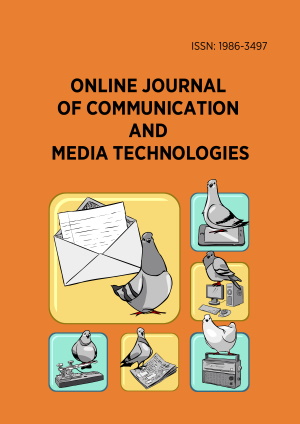Research Article
The Selection of News in the International Reporting of the Macedonian, Slovenian and Serbian Daily Newspapers (2013-1989-1983)
More Detail
1 Macedonia* Corresponding Author
Online Journal of Communication and Media Technologies, 8(2), April 2018, 145-164, https://doi.org/10.12973/ojcmt/2359
OPEN ACCESS 2474 Views 1102 Downloads
ABSTRACT
This paper aims to present the selection of news in the international reporting of the daily newspapers from Macedonia, Slovenia and Serbia in a distance of three decades. We begin this study by using the method of quantitative content analysis. Results give concrete number of articles, photographs and other content published in foreign policy sections of the newspapers Nova Makedonija, Vecer, Delo and Politika. The data analyzed was gathered over a four month period, from the years 2013, 1989 and 1983. Analysis demonstrates significant drop of the number of media content for international events printed in 2013, a period during which are also allocated fewer pages to foreign policy sections. With the exception of the Serbian newspaper Politika, international events in the printed editions are usually published after those media content dedicated to internal political issues and economic topics from Macedonia and Slovenia. This empirical research proves that international reporting in the Macedonian, Slovenian and Serbian newspapers is experiencing a serious decline today without any prospect of improving the current situation in the next period.
CITATION (APA)
Blazhevski, B. (2018). The Selection of News in the International Reporting of the Macedonian, Slovenian and Serbian Daily Newspapers (2013-1989-1983). Online Journal of Communication and Media Technologies, 8(2), 145-164. https://doi.org/10.12973/ojcmt/2359
REFERENCES
- Bennett, W.L. (2012). News: The Politics of Illusion. 9th edn. New York: Longman.
- Bird, S. E. (ed.) (2010). The Anthropology of News & Journalism: global perspectives. Bloomington, Indianapolis: Indiana University Press.
- Davies, N. (2009). Flat Earth News: An Award-Winning Reporter Exposes Falsehood, Distortion and Propaganda in the Global Media. London: Vintage Books.
- Fenko, B.A. and Sabic. Z. (2013). "Continuity and Change in Slovenia’s Foreign Policy: A Comparison to Yugoslavia and an Analysis of the Post-independence Period". Available from http://www.eisa-net.org/bebruga/eisa/files/events/warsaw2013/Bojinovic%20Fenko&Sabic_Continuity%20and %20Change%20in%20Slovenia's%20Foreign%20Policy.pdf (Accessed 12.10.2017).
- Gavranov, V. & Stojkovic, M. (1972). Međunarodni odnosi i spoljna politika Jugoslavije [International Relations and Foreign Policy of Yugoslavia]. Belgrade: Savremena administracija. [In Serbian]
- Gerbner, G. & Marvanyi, G. (1975). The Many Worlds of The World’s Press: A multinational cooperative and comparative study of foreign news coverage. The Annenberg School for Communication at University of Pennsylvania. Available from http://web.asc.upenn.edu/gerbner/Asset.aspx?assetID=1648 (Accessed 10.06.2015).
- Hatchen, A.W. & Scotton, F.J. (2012). The World News Prism: Challenges of Digital Communication. 8th edn. Chichester: Wiley-Blackwell.
- Herman, S. E. & Chomsky, N. (1988). Manufacturing Consent: The Political Economy of the Mass Media. New York: Pantheon Books.
- Kardelj, E. (1985). The Historical Roots of Non-Alignment. Washington: University Press of America.
- Kunczik, M. & Zipfel, A. (1998). Introduction to the Science of Publicism and Communication. Skopje: Foundation Friedrich Ebert. [In Macedonian]
- McChesney, W. R. (2008). The Political Economy of Media. New York: Monthly Review Press.
- McNair, B. (2011). An Introduction to Political Communication. 5th edn. Abingdon: Routledge.
- Meyer, T. (2003). Media Democracy: How the Media Colonize Politics. Zagreb: Faculty of Political Science, University of Zagreb. [In Croatian]
- Nacev, Z. & Petreski, T. (2013). Стратегиски проекции на Република Македонија во надворешната и безбедносната политика [Strategic Projections of the Republic of Macedonia in Foreign and Security Policy]. Kocani: Evropa 92. [In Macedonian]
- Novakovic, I. (2012). Neutralnost u Evropi u 21 veku i slučaj Srbije [Neutrality in Europe in the XXI century and the Case of Serbia]. Available from https://www.isacfund.org/download/Neutralnost_u_Evropi_u_21_veku_i_slucaj_Srbije.pdf (Accessed 12.10.2017). [In Serbian]
- Radeljic, B. (2012). Europe and the Collapse of Yugoslavia: The Role of Non-State Actors and European Diplomacy. New York: I.B. Tauris & Co Ltd.
- Shafer, R. (1997). "The Press and the Preservation of Yugoslavija Before 1990: TANJUG’s Leadership of the Non-Aligned News Agencies Pool". The Global Network, 8, 56-69.
- Street, J. (2003). Mass Media, Politics and Democracy. Zagreb: Faculty of Political Science, University of Zagreb. [In Croatian]
- Topuz, H. (1977). The News Agencies Pool of Non-Aligned Countries. UNESCO. Available from http://unesdoc.unesco.org/images/0002/000247/024782eb.pdf (Accessed 12.10.2017).
- Zixue, T. (2005). "News Events, News Values and Editors’ Judgments: The Cases of China, Taiwan and Japan". Global Media Journal, American Edition, 6 (2). http://www.globalmediajournal.com/open-access/news-events-news-values-andeditors-judgments-the-cases-of-china-taiwan-and-japan.pdf (Accessed 12.10.2017).

 The articles published in this journal are licensed under the CC-BY Creative Commons Attribution International License.
The articles published in this journal are licensed under the CC-BY Creative Commons Attribution International License.